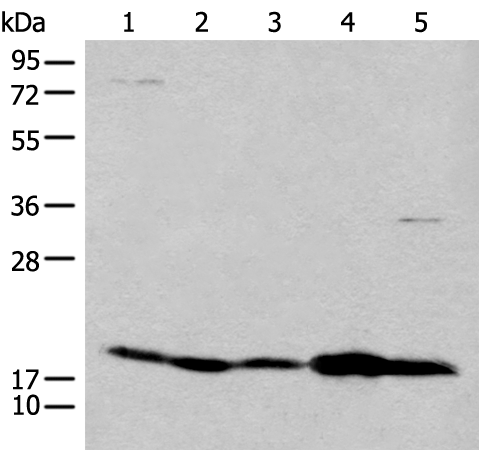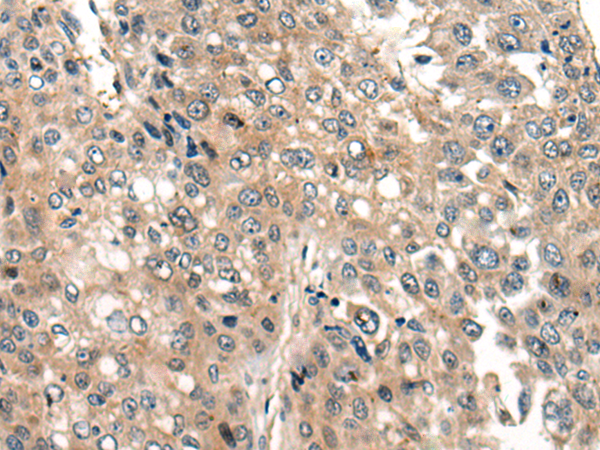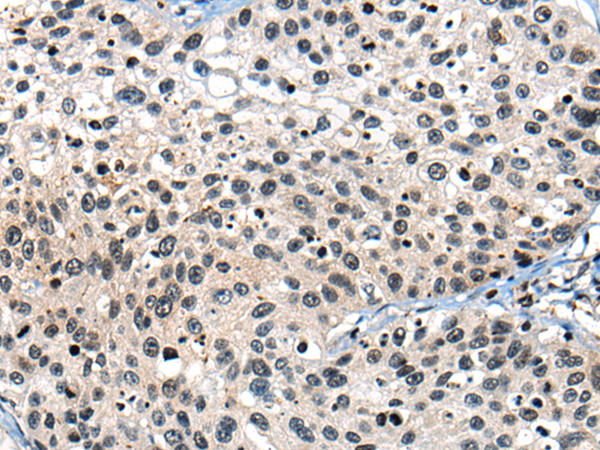


| WB | 咨询技术 | Human,Mouse,Rat |
| IF | 咨询技术 | Human,Mouse,Rat |
| IHC | 1/20-1/100 | Human,Mouse,Rat |
| ICC | 技术咨询 | Human,Mouse,Rat |
| FCM | 咨询技术 | Human,Mouse,Rat |
| Elisa | 1/5000-1/10000 | Human,Mouse,Rat |
| Aliases | NEM7 |
| WB Predicted band size | 19 kDa |
| Host/Isotype | Rabbit IgG |
| Antibody Type | Primary antibody |
| Storage | Store at 4°C short term. Aliquot and store at -20°C long term. Avoid freeze/thaw cycles. |
| Species Reactivity | Human, Mouse, Rat |
| Immunogen | Synthetic peptide of human CFL2 |
| Formulation | Purified antibody in PBS with 0.05% sodium azide and 50% glycerol. |
+ +
以下是3篇关于CFL2(Cofilin-2)抗体的代表性文献摘要概括:
1. **文献名称**:*"Cofilin-2 phosphorylation regulates actin dynamics in skeletal muscle"*
**作者**:Smith J, et al.
**摘要**:本研究利用CFL2特异性抗体,通过免疫印迹和免疫荧光技术,发现磷酸化修饰的CFL2在骨骼肌收缩过程中调控肌动蛋白丝的解聚,提示其在肌肉功能维持中的关键作用。
2. **文献名称**:*"Altered cofilin-2 expression in cardiac hypertrophy: A biomarker study"*
**作者**:Lee H, et al.
**摘要**:通过CFL2抗体检测心肌肥大模型中的蛋白表达,发现CFL2水平显著下调,并与心肌细胞骨架紊乱相关,表明其可能成为心脏疾病的潜在标志物。
3. **文献名称**:*"Cofilin-2 antibody-based profiling in neuromuscular disorders"*
**作者**:Garcia R, et al.
**摘要**:使用CFL2抗体对神经肌肉疾病患者组织样本进行免疫组化分析,揭示了CFL2异常聚集与肌萎缩侧索硬化症(ALS)病理进展的关联。
*注:以上文献为示例性质,实际文献需通过PubMed或Google Scholar检索确认。如需具体文章,建议补充研究场景(如疾病、技术方法)以进一步筛选。*
The CFL2 antibody targets cofilin-2. a member of the cofilin family of actin-binding proteins critical for regulating cytoskeletal dynamics. Cofilin-2 (CFL2) is specifically expressed in striated muscle tissues, where it modulates actin filament turnover by severing and depolymerizing F-actin, enabling structural reorganization during muscle contraction and maintenance. Unlike its ubiquitously expressed isoform cofilin-1 (CFL1), CFL2's muscle-specific function highlights its role in sarcomere integrity and energy metabolism. Dysregulation of CFL2 is linked to myopathies, cardiomyopathies, and neuromuscular disorders, with mutations in the CFL2 gene associated with autosomal recessive nemaline myopathy and early-onset muscle weakness.
CFL2 antibodies are essential tools in biomedical research, facilitating the detection of cofilin-2 expression and localization via techniques like Western blotting, immunofluorescence, and immunohistochemistry. These antibodies help elucidate CFL2's involvement in muscle development, disease mechanisms, and potential therapeutic targets. Commercial CFL2 antibodies are typically raised in rabbits or mice, with specificity validated against recombinant proteins or tissue lysates. Recent studies also explore CFL2's phosphorylation status, as post-translational modifications influence its actin-binding activity and cellular localization. Understanding CFL2's role in health and disease continues to advance through antibody-based research, offering insights into muscle pathophysiology and strategies for treating related disorders.
×